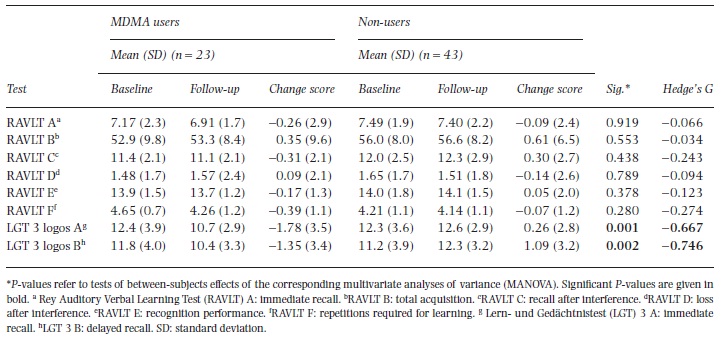Neuroscience

In the context of the obvious methodological limitations associated with studying recreational drug use, this research is unique insofar as it is a prospective cohort study and so, examines the effects of E on non-users who said they intended to use E during the next 12 months. The users and non-users were well matched and drug use was confirmed by hair testing in a random sample (one-third) for MDMA, 3,4-methylenedioxyamphetamine (MDA), 3,4-methylenedioxy-N-ethylamphetamine (MDEA), amphetamine, methamphetamine and cannabinoids.
This is a more intriguing study of E than most because the participants were "almost MDMA naive" (a lifetime maximum of 5 Ecstasy tablets) and had no history of



- The Joy Of 5-ht4 Receptors
Move over, melanocortin receptors, 5-HT4 receptors are ready to take your place. Agonists of the 5-HT4 receptor, a subtype of the serotonin receptor family, seem to do the following, according to recently published reports: (1) mediate the appetite-suppressing...
- "starving Is Just Like Ecstasy For Anorexics"...no!!
Say it isn't so! Gad, here's another sensationalistic headline to deconstruct: Starving is like ecstasy use for anorexia sufferers 09:00 02 October 2007 NewScientist.com news service Alison MotlukAnorexia and ecstasy use activate...
- Neuropsychology Abstract Of The Day: Prospective Memory
Remember to Buy Milk on the Way Home! A Meta-analytic Review of Prospective Memory in Mild Cognitive Impairment and Dementia. Journal of the International Neuropsychological Society. 2012 May 18;:1-11 Authors: van den Berg E, Kant N, Postma A Abstract...
- Neuropsychology Abstract Of The Day: Pediatric Epilepsy And Memory Assessment
Everyday verbal memory and pediatric epilepsy Epilepsy and Behavior. 2011 Jul; 21(3): 285-290. Chapieski L, Evankovich K, Hiscock M, Collins R Abstract This study addressed the reliability and validity of reports of everyday verbal memory with a sample...
- Drug Buddy: Ecstasy To Self-medicate Depression?
This is not ecstasy, but it's better than cocaine. and you know that I will miss you when you're gone but I'm not equipped to play this game The Czars (Drug) Antidepressant‐like effects of ecstasy in subjects with a predisposition...
Neuroscience
Ecstasy ~ Russian Roulette with your Memory
‘The general agreement that is emerging about ecstasy is that while you are using the drug, you might expect a very subtle memory impairment but it’s probably not significant in the real world ...[and] When you stop using it, as most people do, things go back to the way they were.’To E or not to E - that is the question. I felt compelled to say something triggered by an article in Today's Daily Mail Ecstasy tablets are far more harmful than previously thought - and taking just ten can cause brain damage. The article is based on a unique and important paper by Wegner and colleagues entitled "A prospective study of learning, memory, and executive function in new MDMA users" (to be published shortly in Addiction).
-Professor V Curran, Daily Mail 26/7/2012
In the context of the obvious methodological limitations associated with studying recreational drug use, this research is unique insofar as it is a prospective cohort study and so, examines the effects of E on non-users who said they intended to use E during the next 12 months. The users and non-users were well matched and drug use was confirmed by hair testing in a random sample (one-third) for MDMA, 3,4-methylenedioxyamphetamine (MDA), 3,4-methylenedioxy-N-ethylamphetamine (MDEA), amphetamine, methamphetamine and cannabinoids.
This is a more intriguing study of E than most because the participants were "almost MDMA naive" (a lifetime maximum of 5 Ecstasy tablets) and had no history of
"...ingestion of any other illicit psychotropic substances besides cannabis on more than five occasions before the day of the first examination; a history of alcohol misuse (according to DSM-IV criteria, APA 1994); and regular medication (except for contraceptives)...Main inclusion criterion at baseline was a high probability of future ecstasy use"- So, a remarkable sample of pretty clean-living individuals until now!
Over the 12 months, 23 participants did use more than 10 Ecstasy tablets (mean= 33.6, range 10-62; mean occasions 13.5, range 4-36). The remaining individuals used Ecstasy once or more, but less than 10 times and were excluded from the analyses. The controls consisted of 43 participants who had not indulged in any recreational drug use during the year or previously.
The groups (E users and non-users) did not differ in gender distribution, age, years of education, duration of cannabis use before the 1st assessment, duration of cannabis use between the 1st and the 2nd assessments, mean days since last cannabis use at 2nd assessment, or Ravens Matrices (a measure of general intellectual reasoning)
Neurocogitive testing
Wagner et al gave participants a range of executive and memory tests. The main findings were no significant differences between E users and non-users for a measure of verbal learning and memory (auditory verbal learning task), but moderate-large effects on a measure of visual paired associate learning and memory (LGT3) both for immediate and delayed testing (-.667 & -.746: see Table 1).
Table 1. Memory in Ecstasy users and non-users

Conclusions
Wagner and colleagues conclude there were:
"Significant effects of immediate and delayed recall of a paired associates learning task between subjects who used 10 or more ecstasy pills and subjects who did not use any illicit substance apart from cannabis during the course of the year (non-users) were found. No significant differences were found on any of the other neuropsychological tests."
Now, it doesn't surprise me that Wagner et al found moderate to large effects of E on memory. In 2007, along with Joy Kokkalis, I wrote Ecstasy (MDMA) and memory function: a meta-analytic update. We meta-analysed 28 published studies assessing the effects of E on memory in over 600 users and 400 non-users. We reported large impairments of verbal STM (d=.63) and LTM (d=.87) memory - equivalent to performance in over three-quarters of ecstasy users being worse than in non-ecstasy using controls. Crucially, the degree of memory impairment was unrelated to the lifetime number of tablets consumed (mean range was 16-902 in the studies). By contrast, we found no effect of E on visual memory, but did find that concurrent cannabis use impacted specifically on visual memory
Robert E Niro: the Deer Hunter
Our finding that lifetime dose did not predict degree of memory impairment suggests a non-linear relationship and that taking E may be akin to playing Russian Roulette with your memory - for some a large number of tablets may be required before memory is impaired, but for others very few may be necessary - the reasons for the individual differences remain unknown to scientists and most importantly, unknown to anyone using E.
and Final...E
I started by saying that the Daily Mail article prompted me to blog this - not because the journalist got anything wrong necessarily, but because I couldn't see how Professor Val Curran (from UCL) could justifiably make the assertions outlined at the top of this post. In addition to our meta-analysis, at least five other meta-analyses (Verbaten, 2003; Nulsen et al, 2010; Zakzanis et al 2007; Kalechstein et al 2007; and Murphy et al 2012) - have reported moderate to large memory impairment associated with recreational Ecstasy use.
When talking about recreational drugs, it is easy to be misrepresented in the press (as I have discovered). Nevertheless, in our minds, quotes from well-respected scientists are assumed to be reliable...and in the area of recreational drug use, it is all to easy to see how pithy quotes regularly shape thinking in the general public - even though the empirical evidence runs in the contrary direction.
I am beginning to wonder if the recent problems in psychology (false data, retractions and so on) reflect a problem that is all too peculiar to psychologists - too many experts offering too many opinions. As scientists who work with people, we are often asked to comment on surprising findings concerning human behaviour, the brain... life and the universe. Sometimes its fine because we know the literature and have read the paper, but at other times, experts clearly have not read the paper, dont seem to know the literature but still offer an opinion - I am convinced that giving - what are nothing nore than personal or lay opinions essentially - would be far less likely in other sciences...another possibility of course is that the expert studiously avoids citing evidence because of a preferred personal conviction - science?
So, is there general agreement that the memory problems associated with E are subtle, do not impact real world and return to normal?
You used to slide down the carpeted stairs Or down the banister You stuttered like a kaleidoscope 'Cause you knew too many words The Magnetic Fields - 'Take Ecstasy with me'
References
Kalechstein AD, De La Garza R, 2nd, Mahoney JJ, 3rd, Fantegrossi WE, Newton TF. (2007). MDMA use and neurocognition: a meta-analytic review. Psychopharmacology; 189:531–537
Laws KR, Kokkalis J. (2007) Ecstasy (MDMA) and memory function: a meta-analytic update. Hum Psychopharmacol ;22:381–388
Murphy, P.N., Bruno, R., Wareing, M., Ryland, I., Fisk, J.E., and Montgomery, C. (2012). The effects of ecstasy (MDMA) on visuospatial memory performance: Findings from a systematic review with meta-analysis. Human Psychopharmacology: Clinical and Experimental, 27, 113-138
Nulsen CE, Fox AM, Hammond GR (2010). Differential effects of ecstasy on short-term and working memory: a meta-analysis. Neuropsychol Rev. 20:21-32.
Wagner D, Becker B, Koester P, Gouzoulis-Mayfrank E & Daumann J (in press) A prospective study of learning, memory, and executive function in new MDMA users. Addiction
Zakzanis K. K., Campbell Z., Jovanovski D. (2007) The neuropsychology of ecstasy (MDMA) use: a quantitative review. Human Psychopharmacology: Clinical and Experimental , 22, 427-435
.

- The Joy Of 5-ht4 Receptors
Move over, melanocortin receptors, 5-HT4 receptors are ready to take your place. Agonists of the 5-HT4 receptor, a subtype of the serotonin receptor family, seem to do the following, according to recently published reports: (1) mediate the appetite-suppressing...
- "starving Is Just Like Ecstasy For Anorexics"...no!!
Say it isn't so! Gad, here's another sensationalistic headline to deconstruct: Starving is like ecstasy use for anorexia sufferers 09:00 02 October 2007 NewScientist.com news service Alison MotlukAnorexia and ecstasy use activate...
- Neuropsychology Abstract Of The Day: Prospective Memory
Remember to Buy Milk on the Way Home! A Meta-analytic Review of Prospective Memory in Mild Cognitive Impairment and Dementia. Journal of the International Neuropsychological Society. 2012 May 18;:1-11 Authors: van den Berg E, Kant N, Postma A Abstract...
- Neuropsychology Abstract Of The Day: Pediatric Epilepsy And Memory Assessment
Everyday verbal memory and pediatric epilepsy Epilepsy and Behavior. 2011 Jul; 21(3): 285-290. Chapieski L, Evankovich K, Hiscock M, Collins R Abstract This study addressed the reliability and validity of reports of everyday verbal memory with a sample...
- Drug Buddy: Ecstasy To Self-medicate Depression?
This is not ecstasy, but it's better than cocaine. and you know that I will miss you when you're gone but I'm not equipped to play this game The Czars (Drug) Antidepressant‐like effects of ecstasy in subjects with a predisposition...
